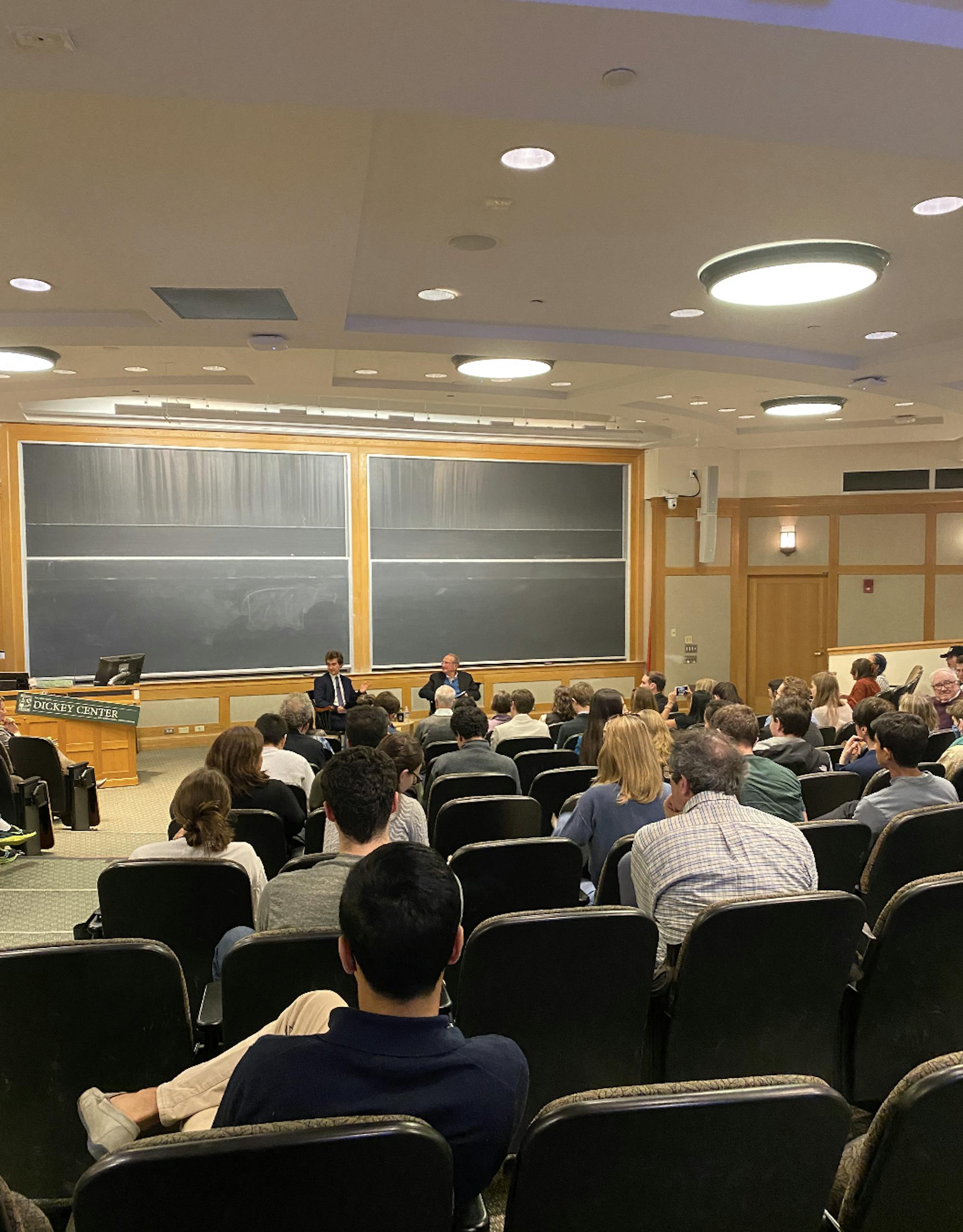Former Central Intelligence Agency director and deputy secretary of defense for the Clinton administration John Deutch spoke on campus on Monday about his struggle to transform the CIA after the Cold War. The talk, titled “America's Role on the World Stage,” was organized by the Dartmouth Political Union and the Dickey Center for International Understanding, according to an email sent to campus by the DPU.
Deutch addressed approximately 220 in-person attendees in Filene Auditorium and 80 participants on Zoom, according to incoming DPU president Emma Elsbecker ’24. Current DPU president William Reicher ’22 explained that Deutch’s visit marks the DPU’s first on-campus “big name speaker” since the start of the pandemic.
Dickey Center director Victoria Holt wrote in an emailed statement to The Dartmouth that she was impressed by Deutch’s wide-reaching experiences, which include security, intelligence, foreign policy, climate change, chemistry and engineering, according to Reicher.
“He demonstrates that one person can mix academic rigor and public policy and engage in problem-solving on major issues in multiple ways,” Holt wrote. “He has worked on issues across energy supplies to preventing the spread of nuclear weapons to thinking about NATO and when the U.S. should engage militarily.”
“I think it’s really interesting to hear from somebody who is working at a high level of government but who is not working in politics,” Blake McGill ’22, one of the attendees, added. “I think often that technocrats look at the work they do in a different way.”
Reicher began the conversation by asking Deutch about his role in American foreign policy during the conflicts in the Balkans and in Iraq and Afghanistan, as well as his current thoughts on foreign affairs. Deutch also took questions from the audience, including both those attending in-person and those listening through Zoom.
Reicher asked Deutch about actions that the CIA took before, during and after his tenure as CIA director. Specifically, he inquired about the Iraq War, which Deutch acknowledged as “one of the main failings of the CIA.” Reicher also asked about Saddam Hussein’s weapons of mass destruction and the Rwanadan genocide — the CIA’s handling of both of which Deutch said he regretted during the talk.
“I was very interested in the answer he gave to the Rwandan genocide because there were a lot of big issues he was dealing with at the time,” Reicher said. “It was his goal to revitalize this agency that for the majority of its existence, at that point, had only been focused on countering the Soviet Union.”
Deutch also discussed the security implications of climate change — saying drought causes people to migrate, and migration can lead to conflict — as well as the CIA’s capacity to handle threats from rising great powers, such as China. He said the latter depends on military force and defense and intelligence agencies.
After Reicher’s segment, students and community members voiced their opinions and concerns to Deutch about U.S. foreign policy. Some attendees questioned the way in which the United States left Afghanistan, while others asked whether the country has a responsibility to intervene in humanitarian crises. In the talk, Deutch said that it was in the U.S.’s strategic interest to leave, while he said humanitarian intervention must be viewed on a case by case basis.
“He holds strong views, and those in the audience rightly asked tough questions — and didn’t always agree with his answers,” Holt wrote. “I think it’s important for all of us at Dartmouth to engage in dialogue to understand those differences and perspectives.”
Reicher added that some of Deutch’s answers to both his and the audience’s questions were “very blunt,” explaining that the combination of Deutch’s personality and the sensitivity of classified information resulted in Deutch being unable to expand beyond one word answers at times.
“I would say he was blunt with many of his answers,” Jack Wright ’25, one of the event attendees, said. “He seemed very stuck to his opinions that have been developing for a while, so I’m not sure I can blame him… Multiple times he said no to a question and didn’t care to explain anything else.”
Deutch gave an additional lecture at the Arthur L. Irving Institute for Energy and Society on Tuesday, according to an email sent by the Irving Institute. The event, which was also livestreamed, discussed 50 years of energy policy and lessons for the future. The talk was a part of the Dartmouth Energy Collaborative’s Energy Seminar series and the Thayer School of Engineering’s Great Issues in Energy series.
After Monday’s event, the DPU executives and ambassadors attended a dinner with Deutch and his wife, according to Reicher. McGill said she also had lunch with Deutch through the War and Peace Fellows program, in which she learned more about Deutch’s political perspectives.
“As someone who worked in intelligence, it was interesting to hear his perspective on how he may or may not weigh political things with protecting the American people,” McGill said. “I thought that was an interesting tension and conflict that he talked a lot about during the lunch, as well as the public event.”
Reicher added that students who attended the dinner “really got the sense of him as a different kind of person than when he was at the event.”
“He really was able to loosen up and answer a lot of questions that he may not have been able to answer in a more public setting, and you really get the sense that . . . he is just a great, funny person,” Reicher said.




